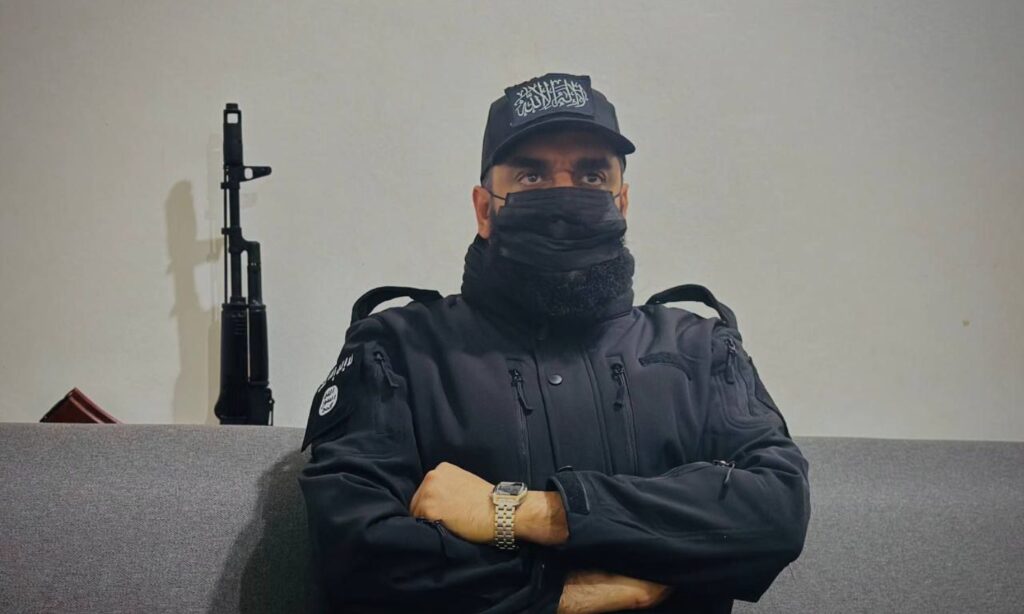Abu Maria al-Qahtani, a member of the Shura Council and a leader in Hayat Tahrir al-Sham (HTS), which wields military influence in Idlib, was killed by an explosion of an improvised explosive device that targeted him in the Sarmada area in the northern countryside of Idlib.
Military media figures close to Tahrir al-Sham and leaders in the faction mourned al-Qahtani on Thursday, April 4, without providing exact details of the incident.
The head of the Supreme Fatwa Council in Tahrir al-Sham, Abdul Rahim Atoun, said that al-Qahtani was killed in an attack using an explosive belt, carried out by a member belonging to the Islamic State organization.
Defectors from Tahrir al-Sham accused the faction’s leader, Abu Mohammad al-Jolani, of the assassination of al-Qahtani, among them the former leader in Tahrir al-Sham and its defector Saleh al-Hamwi, who stated that al-Jolani assassinated al-Qahtani in an ambush on the Sarmada road with his escort, and that he is ready to kill anyone who stands in his way of power.
In a story circulated through Telegram identifiers close to Tahrir al-Sham, it is claimed that an explosion occurred inside the guest house of the leader Abu Maria al-Qahtani in Sarmada.
The second man in Hayat Tahrir al-Sham and one of the founders of al-Nusra Front in Syria, Abu Maria al-Qahtani (Nasser al-Ahmad)
The killing of al-Qahtani comes 28 days after his release by Tahrir al-Sham, following six months of detention on grounds of “treason and communication with internal and external hostile entities.”
On March 7, the judicial committee tasked with investigating the file stated that al-Qahtani was innocent of the charge of “treason,” as the evidence for which he was detained was invalid, as his arrest was based on testimonies received from detainees charged with the same offense.
For a year now, Tahrir al-Sham has been witnessing internal disagreements and cracks over the “treason” file, pushing senior faction leaders into jail, then releasing most of them and apologizing to them.
Today, it faces a popular movement and demands to topple al-Jolani and reject the policy of monopolizing decisions.
The second man in Hayat Tahrir al-Sham and one of the founders of al-Nusra Front in Syria, Abu Maria al-Qahtani (Nasser al-Ahmad)
Abu Maria al-Qahtani, the second man in Tahrir al-Sham, who also goes by another name “Abu al-Hamza,” is Maysar bin Ali al-Jubouri al-Qahtani, nicknamed “al-Harari,” in reference to the Iraqi village of Harara, to which he moved from the village of al-Rasif following his birth there in 1976.
He participated in founding al-Nusra Front (now Tahrir al-Sham) in October 2011, after eight years of working within al-Qaeda in Iraq, and became the deputy to its leader al-Jolani.
From the right, Mazhar al-Wais, a leader in Tahrir al-Sham, Abu Mohammad al-Jolani, the leader of Tahrir al-Sham, and the leader Abu Maria al-Qahtani, with the leading cleric of Tahrir al-Sham Abdul Rahim Atoun in a meeting with dignitaries from the eastern region – July 14, 2022 (Amjad)
He was in charge of fighting the Islamic State organization and was often presented by followers of Tahrir al-Sham as a religious scholar or sheikh, but he was more a commander, executor, and businessman than a scholar.
Between 2014 and 2015, al-Qahtani played a pioneering role as an ideological theorist attacking the “extremists” of the Islamic State organization, eventually earning the title “Conqueror of the Kharijites.”
After the battles in Daraa, al-Qahtani moved to Idlib, in a mysterious transition that surprised many because there is no direct route between the two provinces without passing through areas under the control of the Syrian regime.
Activists said at the time that the route was through Izraa then Daraa to Idlib, in a deal facilitated by people from Deir Ezzor and Damascus.

